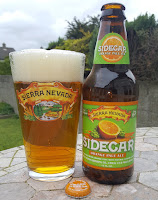 Since time immemorial, or at least some point in the late 1980s, which is the same thing in craft beer terms, Sierra Nevada has been a by-word for hop-forward beers. For beer fanatics of my vintage, if you wanted reliably hoppy in a west coast way, Sierra Nevada was the old reliable. It was very much a brewery to be followed, not a follower, and you wouldn't expect them to go chasing bandwagons.
Since time immemorial, or at least some point in the late 1980s, which is the same thing in craft beer terms, Sierra Nevada has been a by-word for hop-forward beers. For beer fanatics of my vintage, if you wanted reliably hoppy in a west coast way, Sierra Nevada was the old reliable. It was very much a brewery to be followed, not a follower, and you wouldn't expect them to go chasing bandwagons.All of which is a long-winded way of expressing how disappointed I was when I found them making fruited IPAs. Fruited IPAs are for when your hops aren't flavoursome enough, and that has pointedly never been a problem for Sierra Nevada. Anyway. Calm... deep breaths... and let's drink the beers.
The sequence began with Sierra Nevada Peach IPA, on tap at 57 The Headline. And it's not bad, actually. The flavour I got was more like apricot than peach, and the fruit flavour is convincingly hop-like, raising the question of what the point was. After a long phase of smooth and juicy stonefruit it turns very slightly bitter on the end. Though only 5.8% ABV it is a little heavy and risks sickliness, particularly as it warms. It's thankfully not overwhelming with novelty but it's also not very exciting at the same time.
 The same weekend that the Peach IPA arrived on tap, a pair of bottled Sierra fruit beers also appeared. I figured I may as well complete the set.
The same weekend that the Peach IPA arrived on tap, a pair of bottled Sierra fruit beers also appeared. I figured I may as well complete the set.First up was Sidecar, a pale ale with orange peel. Like with the foregoing beer, the base is rather nondescript: a 5.3% ABV medium-bodied pale ale with just a mild bitterness but no stand-out hop character. The added orange doesn't exactly lend dimensions of extra flavour to it -- in fact I'd be hard pressed to identify it if given the beer blind -- but it does add a certain spice: the concentrated zestiness that you get from sniffing the outside of an actual citrus fruit. There's a concentrated oily orangeness in the middle with sweeter fizzy orangeade notes in both the aroma and the finish.
Overall it's a simple and decent beer, quaffable and refreshing, though it would definitely be improved with proper hopping in place of the peel.
 Upping the ante next, to Tropical Torpedo IPA. I honestly don't know why anyone thought beery perfection like Torpedo needed tweaked but here we are. It's a clear bright gold colour and smells mildly dank. Bitterness is very low and once again I can't pick out the fruit. The label says I should be expecting mango, papaya and passionfruit but while there's a vague tropicality there's nothing specifically fruity, and certainly no big hop character. At 6.7% ABV it's quite a bit stronger than the others but it's a lot less full and flavoursome than the Sidecar.
Upping the ante next, to Tropical Torpedo IPA. I honestly don't know why anyone thought beery perfection like Torpedo needed tweaked but here we are. It's a clear bright gold colour and smells mildly dank. Bitterness is very low and once again I can't pick out the fruit. The label says I should be expecting mango, papaya and passionfruit but while there's a vague tropicality there's nothing specifically fruity, and certainly no big hop character. At 6.7% ABV it's quite a bit stronger than the others but it's a lot less full and flavoursome than the Sidecar.I'll call it then: Sierra Nevada would be better sticking to humulus lupulus as the centre of their pale ales. Nobody will remember these beers when the fruit IPA craze has come to a merciful conclusion.





"Fruited IPAs are for when your hops aren't flavoursome enough"
ReplyDeleteNo - the main reason for making them is because the supply of certain hops can't meet market demand. The reason for that rash of grapefruit/citrus IPAs a couple of years ago was because everyone wanted Simcoe/Amarillo etc and the hopgrowers couldn't keep up - it takes 3+ years for a hop plant to get up to full production, you can't just flick a switch on a production line.
Now everyone wants tropical flavours from varieties like Galaxy and Mosaic, so it's no surprise that we're now seeing peach/mango/passionfruit IPAs as demand for those hops is vastly outstripping what the acreage can supply.
Same difference, innit.
Delete